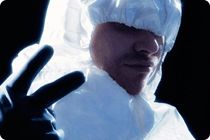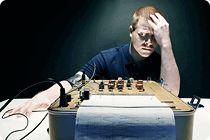El-P: Def by Manipulation
Although he's an acknowledged fixture on New York's hip-hop scene, El-P has always appeared content to fly under the radar — shadowy presence whose unusual production style continues to evolve along a dark, feverish and slightly maladjusted creative seam. Even back in 1996, when he first brought his filth-encased beats, way-out lyrics and old-school sonic aesthetic to the fore with his group Company Flow, it was clear that El (a/k/a El Producto) was much more interested in musical innovation than he was in the over-hyped mainstream game of bling and braggadocio.

Co-founding the Definitive Jux label in 1999 — after a semi-disheartening breakup with Rawkus that same year — El-P quickly got out in front with a new approach in the studio that had eluded most indie producers. Sampling from obvious sources had become too expensive an undertaking, so moving forward called for musicianship as well as expertise in chopping, programming and signal processing. El-P already had the advantage of having grown up under the tutelage of his piano-playing father; with the release of his Def Jux solo debut Fantastic Damage in 2002, he was well on his way to establishing himself as a fully performance-based producer.
Five years later, the near-apocalyptic I'll Sleep When You're Dead found El-P forging into new and more twisted sonic dimensions, with Live playing a key role in his transformation. "I think Live is pushing a lot of us into territory that's more expansive," he observes. "It really allows you to open up and get more serious about your creativity, which from a hip-hop perspective is incredibly important." And as El-P's own vision — and the Definitive Jux mission — grows in scope, no doubt we can expect even more of the unexpected.
Which of Live's functions do you rely on most?
The thing that I love about it and the thing that I essentially use it for is the filtered effects. For me, it's all about taking noises, sounds, bass lines and samples and really transforming them by experimenting with the different combinations of effects. It's amazing to be able to take an existing guitar line and then layer it with a completely effected version. You can cross-fade the two or bring them in at different times — the effects in Live just seem endless in combination. If you really go there and spend some time on it, you can come up with some great sounds.
How did you discover Live?
Years ago when it first came out, DJ Krush was in my basement in Brooklyn, and I guess he had it before anyone else did here. He brought it to my place and we were recording something, and he showed me the program and I was actually pretty amazed by it. I loved being able to manipulate the tempo without changing the pitch. I mean, other programs had that function, but it wasn't very natural. At the time, Live was really the first program that did that smoothly. Being the tech fiend that I am, I just went out and bought it.

How has the program changed your approach to sampling?
You really have to be a different type of producer now, so that you can create without having to worry about being sued. Live gives me a great way to take the mood of a sample and completely manipulate and change it to the point where it's totally unrecognizable, but it still retains some spirit of the original. Then I can fuck it up further — chop it up, take sections and move them around.
Do you recall one song in particular where you did that?
In the middle of "Tasmanian Pain Coaster," the first song on I'll Sleep When You're Dead, there's a tremolo solo that I created in Live. I brought in a chopped-up sample of a sitar, and then I changed the order of the notes and ran it all through a tremolo effect — combined with a couple of other effects — to get the final sound.
Are there any other effects you like to use?
I like the Vinyl Distortion effect. Essentially it feels like a distortion that you can use very subtly to give a bit of graininess to a sound that wasn't there before.
Does the program figure into your live show?
I haven't actually incorporated it into my live set, but I don't use computers when I perform with the band. Even though I know a lot of people use Ableton in a live setting — and it's clearly the best program you can use for that — I've never incorporated it. For the most part I really just use it to accentuate my production.
Flip to El-P's MySpace page at http://myspace.com/elproducto.